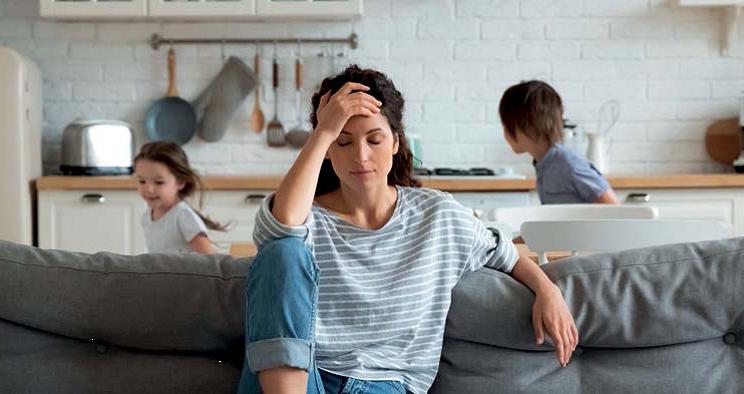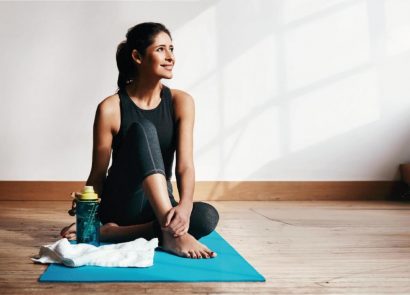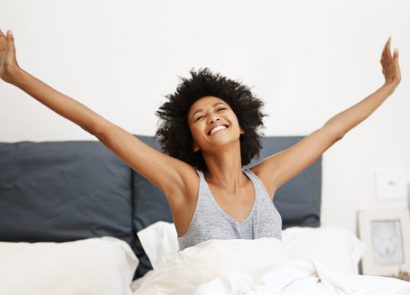Our wellness columnist shares the lessons she’s learned in lockdown life…
As I write this column, we are in the throes of a worldwide pandemic, one that has hurled us into an unprecedented lockdown and an uncertain future. One of the hardest things to overcome in times like these is accepting change and, since we face a situation with no certain outcome, it sends our prehistoric brains into a spiralling panic, because we humans do not like change very much. That is why traditions are so popular and why we find it difficult to break habits. Our brains are always in defence mode in case of a threat, hence we like to know what’s around the corner – in this instance, we simply do not. Of course, as I write this, I write from the past, so hopefully by now we will have seen some sort of progression, headway with a cure, or a flattening of ‘the curve’. But regardless of whether or not we are still in isolation by the time you read this, these crazy times have taught me so many lessons that I want to share. These lessons will not only help to keep you occupied during isolation but also in everyday life, long after this pandemic has passed.
Let go
Firstly, being embroiled in a pandemic has taught me to let go; now more than ever, it has become apparent to me that, when we are faced with a situation we cannot affect, then we must set it free. In the beginning, I spent many days and sleepless nights trying to figure out how the situation could change, how lives, jobs and businesses could be saved, and families not torn apart. However, I soon realised that there was absolutely nothing that I, nor anyone else, could do. So, I stopped and asked myself two important questions. Can I change tomorrow? No. Can I make the most out of now? Yes. And so that’s what I did and continue to do, no matter the situation. ‘Interrupted breathing’ can be a very powerful tool to prevent your mind from becoming fuzzy, spinning out of control and making up nightmarish endings. The technique is simple: inhale for four seconds, hold for eight and exhale for four seconds. As you slowly breathe in, hold the breath in and then out again, focus on the counting of the numbers, the swelling of your chest and the sound of the air flowing through your lungs. These 16 seconds are just a tiny fraction of time but will make a huge difference and give you a chance to reset.
Physical health
Covid-19 has also impacted us physically. Not being able to get to the gym, or do any of our normal daily activities, has not just impacted our mental health but our physiques too. Adaptation is the key here, and so rather than give in to the call of the couch, try to see everything in your home as a piece of gym equipment. Tin cans, water bottles filled with water or pebbles can make great weights, and towels when outstretched and used with small definitive moves can act as resistance bands. Steps, stools or stairs can be used to step up for your butt, and using your body weight is an excellent form of ‘weight’ training. Skipping, jumping, high knees or toe tapping are fantastic ways of getting your cardio hit. Circuits, either on a mat, patio or around your garden can elevate your heart-rate and give you a HIIT session to rival any you would get at the gym. I have been posting many videos of how to work out without equipment on my Instagram page @amandabyram if you need extra inspiration.
Have you tried NLP?
Using neuro-linguistic programming (the practice of programming the brain’s language towards more strategic vocabulary for a more positive outcome) is important to use in everyday life – pandemic or not! When you are talking to your friends and family about the situation, try not to use sentences such as: ‘It’s a nightmare’, ‘I am so stressed’, ‘This is so bad, ‘The world is ending’, ‘We are going to go end up in an economic depression’. I know how real these may seem, however, saying the words out loud will not lead to a healthy mental state. So, try to switch your words and use more positive terminology instead. You will find that changing the narrative is so important when dealing with mental health and making small vocabulary changes can have a big impact, for every situation in life.
Preparation
Being at home for unnatural periods of time has given birth to many unnatural habits. For example, snacking incessantly has become a nationwide obsession during lockdown. The need to rush to the fridge every half an hour is born out of stress for some, for others it is boredom. So, try to remove high-calorie snack items from your food shop ( I had to stop buying peanut butter after I went through two jars in one week by myself!). Preparing your daily meals in advance is not only a fantastic way to curb your isolation-eating-enthusiasm, but also a great way to keep on top of things postpandemic. Make a large pot of brown rice or quinoa; boil six eggs; get five old jam jars and make overnight oats; chop raw veggies; mix a handful of nuts and goji berries in ziplock bags; steam or grill a few pieces of salmon or chicken and put everything into separate Tupperware boxes. Pop them in the fridge and you have a week’s worth of food in advance, ready to go and no excuses to keep raiding the snack cupboard.
It’s also important to use NLP techniques while you shop. If you tell yourself that the whole country is going to be stuck at home and you will run out of food, then your mind will go along with it and act out like an imminent threat is on the horizon. In turn, you will panic-buy every item you love, in bulk. Cue a shopping trolley filled with an unusual surplus of your funday Sunday snacks, that will sit piled in your cupboard, calling to you daily.
Occupy your mind
It’s vital to keep your mind occupied. Write a list of things you may have always wanted to do. How about learning a new language, teaching your kids a new sport or how to make Jamie Oliver’s homemade mayonnaise? Whatever it is, if you can find a few minutes every day to incorporate it, then before you know it, it becomes a part of your daily routine – you might know a few sentences in French, take on Jamie in the kitchen, or be making sports stars out of your kids.
Gratitude
One of my daily practices that I use to help to alleviate anxiety is expressing gratitude, either on paper or out loud. Right now, we find ourselves in one of the most appropriate times to get into the habit of practicing gratitude, not least because the things we should be grateful for are less available than ever.
- Being able to see your loved ones and hold them tight
- Going for a walk more than once a day
- Being in close proximity to another person
- Popping to the shop with fully stocked shelves without fear of mortal danger
- Going to meet a pal for coffee at your local cafe
Reflect and flourish
And finally, I will leave you with some thoughts. I hope that in the aftermath of Covid-19, we can reflect and realise what is important in life:
- We do not need as much toilet paper as we think
- We don’t need gyms as much as we thought. DIY workouts are just as good, and free!
- We do not need to dress up. So maybe stop buying fast fashion; it doesn’t matter if you are up to speed on the latest fashion trends
- Working from home can prove extremely productive. Tell your bosses that you are an adult and can achieve a lot in a quiet environment
- It turns out that we can stop certain industries from over-producing and, in turn, help to save the planet
- We don’t have to drink to have a good time; playing games, catching up with family and hanging with friends on FaceTime was enough for weeks and months on end
- We don’t have to wear make-up to impress. All your friends have seen you bedraggled on FaceTime, Houseparty and Zoom by now!
So, staying occupied, staying fit at home and more importantly staying positive amid such uncertainty is the key to getting through these times. It is important to take stock of all of the things the pandemic has taught us; stress a little less, love a little more and let life take a back seat and focus on what is important. Stay safe and stay well, gang.
Amanda’s daily tips:
- Prepare a workout area, look online for DIY workouts with no equipment needed (see mine on Instagram and my YouTube channel)
- Delete emails from your inbox – this is a great way to have a mental clear-out
- Learn to meditate – there are so many free apps and online-how-to meditate videos available for you to try. So make use of them now!
- Occupy yourself with projects – I’ve been catching up on my old PT books and nutrition courses
- Be inspired to clear off that to-do list
- Call old friends; use this time as an opportunity to reconnect with people you’ve been meaning to catch up with
- Do a new exercise every day, one that you were not able to do before. My press-ups have gotten so much better and easier!
- Prepare meals in advance and refrigerate
- Perhaps take advantage of using your once-daily outing later in the day. No one is around and it’s very peaceful
- Have a wardrobe clear-out – make sure to keep the bag aside for the charity shop once this is all over, do not dump it
- Dream big and plan into the future; give yourself some ‘future you’ inspiration



















